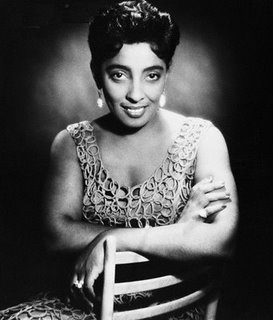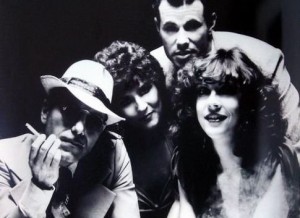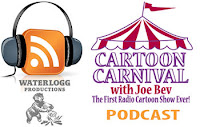 |
Peggy Lee, Ella Fitzgerald, The Manhattan Transfer and more, Saturday as part of The Joe Bev 3-Hour Block, which includes The Comedy-O-Rama Hour & The Joe Bev Experience, starting 2:30 pm ET, 1:30 CT, 11:30 PT on cultradioagogo.com!
More jazz about coffee will fill the air on the 40th edition of Joe Bev's Jazz-O-Rama Hour airing Saturday, May 4th at 3:30 pm ET / 12:30 pm PT, on http://www.cultradioagogo.com (part of Joe Bev 3-Hour Block, beginning at 2:20 pm ET / 11:30 am PT).
 |
| Helen Clark & Franklyn Baur |
This Saturday Joe Bev presents 78 RPM & LP Jazz with a Sense of Humor: "A Java Refill: More Coffee Jazz" including Jack Buchanan and Gertrude Lawrence, Carmen McRae, Ted Weems and The Andrews Sisters.
1. Al Bernard - Hot Coffee (1926) Edison
2. Jack Buchanan and Gertrude Lawrence - A Cup of Coffee, a Sandwich and You (1925) (From the show 'The Charlot Revue of 1926')
3. Helen Clark & Franklyn Baur - A Cup of Coffee, a Sandwich and You (1925)
4. Leo Reisman Orchestra - A Cup Of Coffee A Sandwich and You (1925)
 |
| Carmen McRae |
6. Peggy Lee - Black Coffee (1953)
7. Carmen McRae - Black Coffee / Sarah: Dedicated to You (1991)
8. Manhattan Transfer with Gene Pistilli - Java Jive (1969)
9. The Andrews Sisters with The Vic Schoen Orchestra - The Coffee Song (1946)
10. The Andrews Sisters - A Proper Cup of Coffee (1958)
11. Annette Hanshaw - You're The Cream in My Coffee (1928)
12.The Ted Weems Orchestra with vocal refrain by Parker Gibbs - You're The Cream in My Coffee (1929)
13. Miff Mole & His Little Molars - You're the Cream in My Coffee (1928)
14. Barry Harris Trio - Morning Coffee (1960)
 |
| LINK TO CULT RADIO A GO GO! |
Alfred A. Bernard was an American vaudeville singer, known as "The Boy From Dixie", who was most popular during the 1910s through early 1930s. W. C. Handy credited Bernard with helping his own career by recording a number of his songs, notably "St. Louis Blues". He was the first American singer to record the song "Frankie and Johnny" in America. He also co-wrote songs with Jimmy Durante. In the 1930s & 40s, he recorded hillbilly songs with the Goofus Five, predicting the western swing style.
Walter John "Jack" Buchanan was a Scottish theatre and film actor, singer, producer and director. He is best known in America for his role in the classic Hollywood musical The Band Wagon in 1953. Gertrude Lawrence was an English actress, singer, dancer and musical comedy performer known for her stage appearances in London's West End and on New York's Broadway. The King and I, the Richard Rodgers and Oscar Hammerstein musical, opened on Broadway in March 1951, and Lawrence won the Tony Award for Best Actress in a Musical for her performance.
Franklyn Baur was a popular tenor vocal recording artist. Baur made hundreds of recordings for about a dozen different recording companies, including the three major labels, Victor, Columbia and Brunswick.
Leo Reisman was a violinist and bandleader in the 1920s and 1930s. Born and reared in Boston, Reisman studied violin as a young man, and formed his own band in 1919. He became famous for having over 80 hits on the popular charts during his career. Jerome Kern called Reisman's orchestra "The String Quartet of Dance Bands".
 |
| Manhattan Transfer |
Wilfred Theodore (Ted) Weems (originally Wemyes) (26 September 1901 - 6 May 1963) was a United States bandleader and musician. Weems' work in music was recognized with a star on the Hollywood Walk of Fame.
 |
| Ted Weems |
Irving Milfred Mole, better known as Miff Mole was a jazz trombonist and band leader. He is generally considered as one of the greatest jazz trombonists and credited with creating "the first distinctive and influential solo jazz trombone style." His major recordings included "Slippin' Around", "Red Hot Mama" in 1924 with Sophie Tucker on vocals, "Miff's Blues", "There'll Come a Time (Wait and See)", on the film soundtrack to the 2008 movie The Curious Case of Benjamin Button, and "Toddlin' Blues" and "Davenport Blues", recorded in 1925 with Bix Beiderbecke and Tommy Dorsey as Bix Beiderbecke and His Rhythm Jugglers.
Joe Bevilacqua (Joe Bev) is the recipient of the 2013 Kean University Distinguished Alumni Award.
 |
| JOE BEV |
WATERLOGG PRODUCTIONS
4 PODCASTS
4 PODCASTS
 |  |
 The Joe Bev Experience Podcast on iTunes OR click on the link to the right to hear us online |  OR click on the link to the right to hear us online |
or visit SimplyAudiobooks.com or Audible.com or theaudiobookstore.com or Amazon.com or theAudioBookMart.com or iTunes.com
 |













